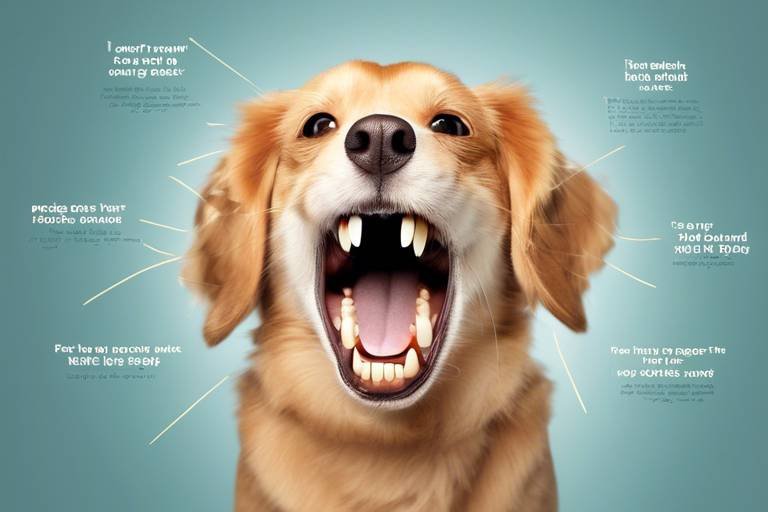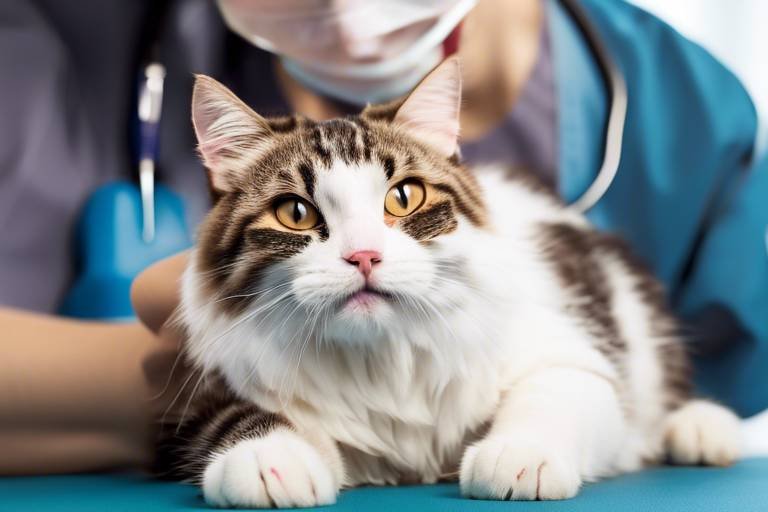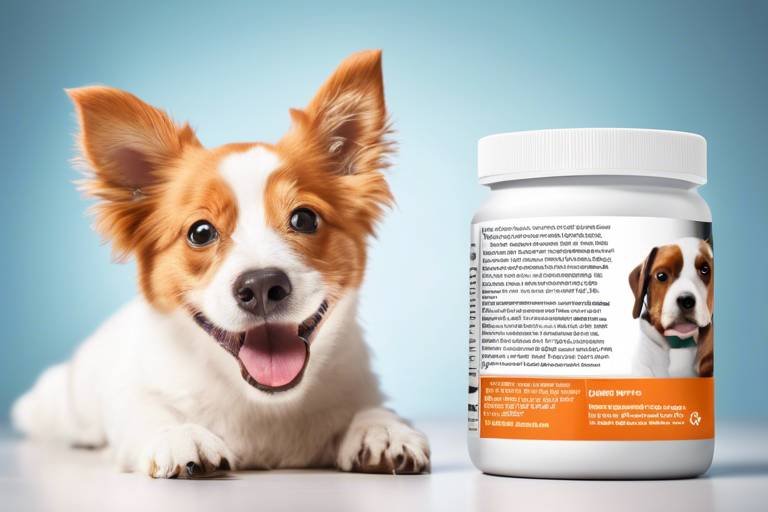Understanding the Benefits of Nutritional Counseling for Pets
Nutritional counseling for pets is not just a trendy buzzword; it's a vital component of pet care that can make a world of difference in your furry friend's life. Just like humans, pets require a balanced diet tailored to their unique needs, and this is where nutritional counseling steps in. Imagine your pet as a high-performance vehicle; without the right fuel, it simply won't run smoothly. Nutritional counseling helps pet owners understand what their pets need to thrive, ensuring they get the right mix of vitamins, minerals, and other essential nutrients. This article dives deep into the myriad advantages of nutritional counseling for pets, shedding light on how customized diets can enhance their health, wellbeing, and overall quality of life.
When it comes to our beloved pets, proper nutrition is paramount. It influences not just their growth and energy levels, but also their longevity. Did you know that a well-balanced diet can add years to your pet's life? It's true! Different species and breeds have specific nutritional requirements, and understanding these can be a game-changer. For example, a growing puppy has different needs compared to a senior dog. By consulting with a nutritional counselor, pet owners can ensure their furry companions receive the right nutrients at every stage of their lives.
Despite our best intentions, many pets suffer from nutritional deficiencies that can lead to serious health issues. These deficiencies can stem from various factors, including poor-quality pet food, lack of variety in their diet, or even specific health conditions. Identifying these deficiencies early is crucial. For instance, a lack of essential fatty acids can result in a dull coat, while insufficient protein can affect muscle development. By recognizing the signs and seeking nutritional counseling, pet owners can prevent long-term complications and ensure a balanced diet.
Recognizing the signs of nutritional deficiencies in pets is vital for prompt action. Common symptoms include:
- Lethargy: A noticeable decrease in energy levels can indicate a lack of essential nutrients.
- Poor coat condition: Dull, dry, or flaky fur often signals nutritional imbalances.
- Digestive problems: Issues like diarrhea or constipation may arise from poor dietary choices.
By being vigilant and observant, pet owners can take the necessary steps to adjust their pet's diet and improve their overall health.
It's fascinating how a pet's behavior can be influenced by what they eat. Changes such as increased aggression or anxiety can sometimes be linked to poor nutrition. A balanced diet rich in essential fatty acids and amino acids can positively influence a pet's mood and behavior. Think of it as feeding them happiness on a plate! When pets receive the right nutrients, they tend to be more relaxed, playful, and content.
Physical symptoms like weight loss, vomiting, or diarrhea often signal nutritional issues. These symptoms should never be ignored, as they can lead to serious health problems if left unaddressed. Addressing these symptoms with proper dietary guidance can significantly improve a pet's health. For instance, if a pet is experiencing digestive issues, a nutritional counselor can recommend a specialized diet that promotes gut health and overall wellbeing.
Many pet owners hold misconceptions about pet nutrition, leading to improper feeding practices. For example, some believe that table scraps are a suitable substitute for a balanced diet. Debunking these myths is essential for ensuring pets receive the right nutrients. A nutritional counselor can provide clarity and guidance, helping pet owners make informed decisions about their pets' diets.
A nutritional counselor specializes in creating personalized diet plans for pets. Their expertise can help pet owners make informed choices about feeding and supplementation. By assessing each pet's unique needs based on factors such as age, breed, activity level, and health status, they ensure that dietary recommendations are effective and safe. This tailored approach is crucial for the health and happiness of our pets.
Nutritional counselors take a comprehensive approach to assess each pet’s unique needs. They consider various factors, including:
- Age: Puppies, adults, and seniors have different nutritional requirements.
- Breed: Certain breeds may be predisposed to specific health issues that require dietary adjustments.
- Activity Level: Active pets may need more calories and nutrients compared to their less active counterparts.
- Health Status: Pets with medical conditions may require specialized diets.
This customized approach ensures that pets receive the optimal nutrition they need to thrive.
Nutritional counselors develop balanced meal plans that provide essential nutrients while considering any dietary restrictions or preferences. This customization promotes better health and satisfaction for pets. For example, if a pet has food allergies, a counselor can design a diet that avoids allergens while still providing all necessary nutrients. The goal is to create a meal plan that not only nourishes but also delights your pet's palate!
Investing in nutritional counseling can lead to long-term health benefits for pets. Improved immunity, reduced risk of chronic diseases, and enhanced quality of life are just a few advantages. By ensuring that pets receive the right nutrients, owners can significantly extend their pets' lives while enhancing their overall wellbeing.
Nutritional counseling plays a vital role in preventing obesity, a common issue among pets. A well-structured diet helps maintain a healthy weight and reduces the risk of related health problems. Obesity can lead to numerous health issues, including diabetes and joint problems, making it essential to address this concern through proper nutrition.
Proper nutrition is linked to increased lifespan in pets. By ensuring balanced diets, owners can significantly extend their pets' lives while enhancing their overall wellbeing. A well-nourished pet is not only healthier but also happier, enjoying life to the fullest.
1. What is nutritional counseling for pets?
Nutritional counseling involves assessing a pet's dietary needs and creating a tailored meal plan to ensure they receive all essential nutrients for optimal health.
2. How do I know if my pet needs nutritional counseling?
If you notice signs of nutritional deficiencies, behavioral changes, or if your pet has specific health conditions, it may be time to consult a nutritional counselor.
3. Can I create a balanced diet for my pet on my own?
While some pet owners can successfully create balanced diets, it's often beneficial to consult with a nutritional counselor for expert guidance and to address any specific health needs.
4. How can nutritional counseling improve my pet's health?
Nutritional counseling can enhance your pet's health by preventing deficiencies, maintaining a healthy weight, and reducing the risk of chronic diseases.

The Importance of Proper Nutrition
When it comes to our furry companions, proper nutrition is nothing short of essential. Just like humans, pets require a balanced diet to thrive, impacting their growth, energy levels, and overall longevity. Think of nutrition as the foundation of a house; without a solid base, everything else crumbles. The right nutrients fuel your pet's body, ensuring they have the energy to play, explore, and enjoy their lives to the fullest.
Understanding the specific nutritional needs of different species and breeds is crucial. For instance, a large breed dog has different dietary requirements compared to a small breed dog or a cat. Each pet's age, activity level, and health status play significant roles in determining what they need to eat. Just as you wouldn’t feed a toddler the same food as a teenager, pets also require tailored diets that cater to their unique needs.
Moreover, the pet food industry is flooded with options, making it easy to get lost in a sea of marketing gimmicks and flashy packaging. It’s vital for pet owners to look beyond the labels and understand what truly constitutes a balanced diet for their pets. A well-rounded diet typically includes:
- Proteins: Essential for muscle development and energy.
- Fats: Provide energy and support cell function.
- Carbohydrates: Source of quick energy and aids digestion.
- Vitamins and Minerals: Support various bodily functions and overall health.
By ensuring that your pet receives a balanced diet rich in these nutrients, you’re not just feeding them; you’re investing in their health and happiness. A nutritious diet can help prevent numerous health issues, such as obesity, diabetes, and even certain cancers. In a world where pet obesity is on the rise, being proactive about your pet's nutrition can significantly impact their quality of life.
In conclusion, the importance of proper nutrition for pets cannot be overstated. It’s the key to a long, healthy, and vibrant life. So, the next time you’re at the pet store, take a moment to consider what’s in your pet’s food. Are you providing them with the best possible nutrition? Remember, a happy pet is a well-fed pet!
- What are the signs my pet is not getting proper nutrition? Look for changes in behavior, coat condition, and energy levels. If your pet seems lethargic or has digestive issues, it might be time to reassess their diet.
- Can I feed my pet human food? While some human foods are safe for pets, many can be harmful. Always consult with a veterinarian before introducing new foods.
- How can I determine my pet's specific nutritional needs? Consulting a nutritional counselor or your veterinarian can help tailor a diet plan based on your pet's individual needs.

Common Nutritional Deficiencies in Pets
When it comes to our furry friends, their nutritional needs can often be overlooked. Many pet owners might assume that a standard commercial pet food is sufficient, but the reality is that pets can suffer from various nutritional deficiencies that can lead to serious health issues. Just like humans, pets require a balanced diet rich in essential nutrients to thrive. Without the right balance, they can face a range of health problems that could have been easily avoided.
One of the most common deficiencies seen in pets is a lack of protein. Dogs and cats are carnivorous by nature, and protein is crucial for their muscle development, energy, and overall health. Insufficient protein can lead to muscle wasting and a weakened immune system. Similarly, a deficiency in omega-3 fatty acids can lead to an array of issues, including poor coat condition and inflammation. These essential fatty acids are vital for maintaining healthy skin and fur, and without them, pets can suffer from dryness, itching, and other skin problems.
Vitamins and minerals also play a crucial role in a pet's diet. For example, a deficiency in calcium can lead to bone problems, particularly in growing puppies and kittens. In contrast, too much calcium can cause health issues as well, highlighting the need for a well-balanced diet. Moreover, pets can also suffer from a lack of vitamin D, which is essential for calcium absorption. This deficiency can lead to serious skeletal issues over time.
To give you an idea of how these deficiencies manifest, here’s a quick overview:
| Nutrient | Common Deficiency Symptoms |
|---|---|
| Protein | Muscle wasting, lethargy, weakened immune response |
| Omega-3 Fatty Acids | Poor coat condition, skin dryness, inflammation |
| Calcium | Bone deformities, dental issues, muscle spasms |
| Vitamin D | Bone pain, skeletal deformities, poor growth |
It's also important to note that certain breeds may have specific dietary needs that could make them more susceptible to deficiencies. For instance, large breed dogs often require a diet tailored to their growth patterns to prevent developmental issues. Therefore, understanding the unique nutritional requirements of your pet is essential for their overall health.
In conclusion, being aware of these common nutritional deficiencies can empower pet owners to take proactive measures. Regular veterinary check-ups and consultations with a nutritional counselor can help identify any potential issues early on, ensuring that your beloved pet receives a balanced diet that supports their health and wellbeing.
Signs of Nutritional Deficiencies
As a pet owner, it’s essential to be vigilant about your furry friend’s health, and one of the key indicators of their wellbeing is their nutrition. Just like us, pets can suffer from nutritional deficiencies that can negatively impact their health and happiness. Recognizing the signs early can be the difference between a quick fix and a long-term health issue. So, what should you look out for?
First and foremost, lethargy is a common sign that something might be off with your pet's diet. If your usually energetic pup is suddenly spending more time napping than playing fetch, it might be time to evaluate their food. Similarly, if your cat is less inclined to chase after that elusive laser pointer, it could indicate a lack of essential nutrients.
Another significant indicator is the condition of your pet's coat. A shiny, healthy coat is often a reflection of good nutrition. If you notice that your pet's fur is looking dull, brittle, or even starting to fall out, this could be a sign of nutritional deficiencies. For example, a lack of fatty acids can lead to dry skin and a lackluster coat. To help illustrate this, here’s a quick comparison:
| Nutrient Deficiency | Signs |
|---|---|
| Fatty Acids | Dull coat, dry skin |
| Protein | Weight loss, muscle wasting |
| Vitamins (e.g., Vitamin A) | Poor vision, skin issues |
Moreover, digestive problems are another red flag. If your pet is experiencing frequent vomiting or diarrhea, it could be due to an imbalance in their diet. These physical symptoms are often the body’s way of signaling that it’s not getting the nutrients it needs to function correctly. Just like a car that runs out of gas, your pet's body can’t perform optimally without the right fuel!
Lastly, keep an eye on any behavioral changes. Increased aggression, anxiety, or even withdrawal can sometimes stem from poor nutrition. A well-balanced diet can positively influence your pet's mood and behavior, making them happier and more sociable. It’s fascinating how much of an impact food can have on our pets’ emotional states!
In conclusion, being aware of these signs can empower you as a pet owner to take action. If you notice any of these symptoms, consulting with a veterinary professional or a nutritional counselor can provide guidance tailored to your pet’s specific needs. After all, just like us, our pets deserve to thrive, not just survive!
- What are the most common nutritional deficiencies in pets? - Common deficiencies include lack of protein, fatty acids, and vitamins.
- How can I improve my pet's diet? - Consult a nutritional counselor or veterinarian for personalized dietary recommendations.
- What should I do if I notice signs of nutritional deficiency? - Seek professional advice to assess your pet's diet and make necessary adjustments.
Behavioral Changes
Have you ever noticed that your furry friend seems a bit off? Maybe they're more aggressive than usual or seem anxious for no reason. These behavioral changes can often be linked back to poor nutrition. Just like us, pets thrive on a balanced diet that provides the right nutrients. When they don’t get what they need, it can affect their mood and behavior significantly.
Imagine how you feel when you skip breakfast or have a junk food binge. You might feel sluggish, irritable, or even a bit foggy. Now, think about your pet. If they’re not getting enough essential nutrients, they can experience similar feelings. A lack of key vitamins and minerals can lead to mood swings, increased aggression, or even anxiety. It’s a domino effect: poor diet leads to poor health, which can lead to behavioral issues.
So, what can you do to help your pet? First, consider a few dietary adjustments. Here are some common nutrients that can positively influence your pet's behavior:
- Omega-3 Fatty Acids: These are known to support brain health and can help reduce anxiety in pets.
- Vitamin B Complex: Essential for energy and mood regulation, a deficiency can lead to irritability.
- Protein: A good source of energy, it’s crucial for maintaining a stable mood.
By focusing on a well-rounded diet, you can help your pet feel more like themselves again. Consulting with a nutritional counselor can be a game-changer. They can assess your pet’s specific needs and help craft a meal plan that supports not just their physical health but also their emotional wellbeing. Remember, a happy pet is a healthy pet, and proper nutrition plays a vital role in achieving that.
- How can I tell if my pet’s behavior is affected by their diet?
Look for signs like increased aggression, anxiety, or lethargy. If these changes coincide with a dietary shift, it might be time to reassess their nutrition. - What should I do if I suspect my pet has a nutritional deficiency?
Consult with a veterinarian or a nutritional counselor to get a proper assessment and tailored dietary recommendations. - Can a better diet really change my pet's behavior?
Absolutely! A balanced diet rich in essential nutrients can significantly improve your pet's mood and behavior.
Physical Symptoms
When it comes to our furry friends, can be the first indicators that something is off in their diet. Just like humans, pets can experience a range of health issues related to poor nutrition. If you notice your pet displaying unusual behaviors or physical signs, it’s crucial to take action. Common symptoms include weight loss, vomiting, and diarrhea, which can all signal nutritional deficiencies.
For instance, if your dog is losing weight despite regular feeding, it might not be getting the right nutrients it needs to maintain a healthy weight. This could be a sign of an underlying health issue or simply a poor diet. Similarly, vomiting can be a reaction to an unbalanced diet or food that doesn’t sit well with your pet’s digestive system. Diarrhea, on the other hand, may indicate that your pet is not absorbing nutrients effectively, which can lead to further complications.
But that’s not all; other can include:
- Dry, flaky skin: This can be a sign of a lack of essential fatty acids in their diet.
- Poor coat condition: A dull or brittle coat often indicates inadequate nutrition.
- Dental issues: Bad breath or gum disease can arise from a diet lacking in proper nutrients.
It’s essential to monitor these symptoms closely. If your pet shows any of these signs, it’s wise to consult with a veterinarian or a nutritional counselor. They can help assess your pet's dietary needs and make necessary adjustments to improve their health. Remember, just like us, pets thrive on a balanced diet tailored to their specific needs. Ignoring these symptoms could lead to more severe health complications down the line.
Q: How can I tell if my pet is getting the right nutrition?
A: Look for signs of good health, such as a shiny coat, healthy weight, and regular energy levels. If you notice any physical symptoms or behavioral changes, consider consulting a nutritional counselor.
Q: What should I do if my pet is overweight?
A: Consult with a nutritional counselor to create a tailored diet plan that promotes healthy weight loss while ensuring your pet still gets the nutrients they need.
Q: Can I feed my pet human food?
A: Some human foods are safe for pets, but many can be harmful. Always check with your veterinarian before introducing new foods into your pet's diet.
Q: How often should I change my pet's diet?
A: Changes in diet should be based on your pet's life stage, health conditions, and activity level. Regular consultations with a nutritional counselor can help determine the best times to adjust their diet.
Common Nutritional Misconceptions
When it comes to pet nutrition, misconceptions can run rampant, often leading to poor dietary choices that can affect our furry friends' health. One of the most prevalent myths is the belief that all pet food is created equal. In reality, the quality of ingredients and nutritional content can vary significantly from one brand to another. Just because a food is marketed as 'premium' doesn't necessarily mean it's the best choice for your pet. It's crucial to read labels and understand what you're feeding your pet.
Another common misconception is that pets can thrive on a vegetarian or vegan diet. While some pets may adapt to such diets, many require specific nutrients found primarily in animal products. For example, cats are obligate carnivores, meaning they need certain amino acids, like taurine, that are found in meat. Neglecting these needs can lead to serious health issues.
Many pet owners also believe that table scraps are a harmless treat. However, human food can often be too rich for pets and may contain ingredients that are toxic to them, such as onions, garlic, and chocolate. Feeding pets from the dinner table can lead to obesity and other health problems, so it’s best to stick to specially formulated pet food.
Furthermore, some owners think that feeding their pets once a day is sufficient. While this may work for some animals, others, especially those with high energy levels or specific health issues, may benefit from more frequent, smaller meals. It's essential to consider your pet's individual needs and consult with a nutritional counselor to establish the best feeding schedule.
Lastly, there’s a misconception that grain-free diets are inherently better for pets. While some pets may have allergies or sensitivities to grains, many can digest them just fine. In fact, grains can provide essential nutrients and fiber. A balanced diet should be tailored to the individual pet's needs rather than adhering to a trend.
By debunking these myths, pet owners can make more informed decisions about their pets' diets. Understanding the truth behind these misconceptions is vital for ensuring your pet receives the right nutrients to lead a healthy and happy life.
- What are the signs that my pet may have a nutritional deficiency? Look for lethargy, poor coat condition, and digestive issues.
- How often should I feed my pet? This depends on your pet's age, breed, and health status. Consult a nutritional counselor for personalized advice.
- Can I feed my pet human food? Some human foods are safe, but many can be harmful. Always check which foods are safe for your pet.
- Is grain-free food better for pets? Not necessarily. It depends on your pet's individual needs and any allergies they may have.
- How can I tell if my pet is getting the right nutrition? Regular vet check-ups and consultations with a nutritional counselor can help ensure your pet's diet meets their needs.

The Role of a Nutritional Counselor
Nutritional counselors play a crucial role in the health and wellbeing of our beloved pets. Imagine having a personal trainer, but for your furry friend’s diet! These specialists are like nutrition detectives, diving deep into the unique dietary needs of each pet. They don’t just throw together a generic meal plan; instead, they tailor recommendations based on a pet's age, breed, activity level, and any existing health conditions. This personalized approach ensures that every pet gets the nutrients they need to thrive.
When you consult with a nutritional counselor, they begin by assessing individual needs. This involves gathering detailed information about your pet's lifestyle and health history. For example, a young, active Labrador will have different nutritional requirements compared to an older, less active Chihuahua. The counselor will analyze factors such as:
- Age: Puppies and kittens require different nutrients compared to senior pets.
- Breed: Certain breeds have specific dietary needs and predispositions to health issues.
- Activity Level: Active pets may need more calories and protein than those who are more sedentary.
- Health Status: Pets with health conditions may require special diets to manage their symptoms.
Once the assessment is complete, the nutritional counselor will create balanced meal plans that are not only nutritious but also enjoyable for your pet. This is where the magic happens! They consider any dietary restrictions or preferences your pet may have, such as allergies or sensitivities. For instance, if your dog is allergic to chicken, the counselor will ensure that the meal plan avoids this ingredient while still providing all the essential nutrients.
Moreover, these counselors often educate pet owners about the importance of proper feeding practices. This can include advice on portion sizes, feeding schedules, and even how to read pet food labels. It’s like having a nutrition coach guiding you every step of the way! By understanding the science behind pet nutrition, owners can make informed decisions that positively affect their pet’s health.
In summary, the role of a nutritional counselor is not just about creating meal plans; it's about fostering a deeper connection between pets and their owners through informed dietary choices. With their expertise, pet owners can feel confident that they are providing their furry companions with the best possible nutrition, ultimately leading to a healthier, happier life.
Q: How often should I consult a nutritional counselor for my pet?
A: It's recommended to consult a nutritional counselor at least once a year, or more frequently if your pet has specific health concerns or dietary changes.
Q: Can a nutritional counselor help with weight management?
A: Absolutely! Nutritional counselors are experts in creating weight management plans tailored to your pet's needs, helping them achieve and maintain a healthy weight.
Q: Are nutritional counseling services expensive?
A: Costs can vary depending on the counselor's experience and the services provided. However, investing in your pet's nutrition can save you money in the long run by preventing health issues.
Assessing Individual Needs
When it comes to our beloved pets, one size definitely does not fit all. Just like humans, each pet has its own unique set of requirements based on several factors. A nutritional counselor takes a deep dive into these factors to create a customized diet plan that caters specifically to your furry friend. So, what exactly do they assess? Let’s break it down.
First and foremost, age plays a crucial role in determining nutritional needs. Puppies and kittens have different dietary requirements compared to adult or senior pets. For instance, young pets need higher protein and fat levels to support their rapid growth, while older pets may require diets that are lower in calories to maintain a healthy weight.
Next up is the breed of your pet. Different breeds have varying predispositions to certain health issues, which can influence their nutritional needs. For example, large breeds like Great Danes may need diets that support joint health, while smaller breeds may require more energy-dense foods to meet their higher metabolic rates.
Another important factor is the activity level of your pet. Is your dog a couch potato, or does he run circles around you at the park? An active pet will require more calories and nutrients to fuel their energy levels, while a less active pet may need a more controlled diet to prevent obesity.
Lastly, the health status of your pet cannot be overlooked. Pets with pre-existing conditions, such as diabetes or allergies, may need specialized diets to manage their health effectively. A nutritional counselor will take these factors into account to ensure that the meal plan is not only nutritious but also safe for your pet.
To summarize, assessing individual needs involves a comprehensive evaluation of:
- Age - Different life stages require different nutrients.
- Breed - Each breed has unique health considerations.
- Activity Level - More active pets need more calories.
- Health Status - Special diets for pets with health issues.
This tailored approach not only enhances the effectiveness of the diet but also significantly improves your pet's overall health and happiness. By understanding these individual needs, a nutritional counselor can help you make informed choices that lead to a longer, healthier life for your furry companion.
- What is nutritional counseling for pets? - It's a specialized service that helps pet owners create personalized diet plans based on their pet's unique needs.
- How can I tell if my pet has nutritional deficiencies? - Look for signs such as lethargy, poor coat condition, and digestive issues.
- Is nutritional counseling worth the investment? - Absolutely! It can lead to better health, improved longevity, and a happier pet.
- Can I do this myself? - While some pet owners may have a good understanding, a professional counselor can provide expertise and tailored advice that is hard to replicate.
Creating Balanced Meal Plans
Creating balanced meal plans for pets is not just about throwing some kibble in a bowl and calling it a day. It’s an art and a science that requires a deep understanding of a pet's unique nutritional needs. Just like humans, pets require a variety of nutrients to thrive, and a one-size-fits-all approach simply doesn’t cut it. A well-crafted meal plan considers factors such as the pet’s age, breed, activity level, and any existing health conditions. For example, a young, energetic puppy has different dietary requirements than a senior dog who may be less active and more prone to weight gain.
When developing a balanced meal plan, a nutritional counselor will typically focus on several key components:
- Proteins: Essential for growth, repair, and maintenance of body tissues. Sources can include meat, fish, and plant-based proteins.
- Carbohydrates: Provide energy and support digestive health. Whole grains and vegetables are excellent sources.
- Fats: Important for healthy skin and coat, as well as energy. Omega-3 and Omega-6 fatty acids are particularly beneficial.
- Vitamins and Minerals: Vital for various bodily functions, from immune support to bone health. A variety of fruits and vegetables can help meet these needs.
To illustrate the importance of balance, consider the following hypothetical meal plan for a medium-sized dog:
| Meal Component | Recommended Amount | Source |
|---|---|---|
| Protein | 1 cup | Chicken or beef |
| Carbohydrates | 1/2 cup | Brown rice or sweet potatoes |
| Fats | 1 tablespoon | Fish oil or flaxseed oil |
| Vegetables | 1/2 cup | Carrots or peas |
This meal plan provides a balanced mix of nutrients tailored to the dog's needs. However, it’s crucial to remember that every pet is different. Regular consultations with a nutritional counselor can ensure that meal plans are updated as pets age or their activity levels change.
Moreover, the experience of the pet can be enhanced by varying the meal plan occasionally. Just like us, pets can get bored with the same food every day! Introducing new ingredients or flavors can keep mealtime exciting and enjoyable for them.
Q: How often should I consult a nutritional counselor for my pet?
A: It's advisable to consult a nutritional counselor at least once a year, or more frequently if your pet has health issues or significant lifestyle changes.
Q: Can I create a balanced meal plan on my own?
A: While it’s possible to create a meal plan yourself, the expertise of a nutritional counselor can ensure that you meet all of your pet's specific needs and avoid common pitfalls.
Q: What if my pet has food allergies?
A: A nutritional counselor can help you navigate food allergies and create a meal plan that avoids allergens while still providing essential nutrients.

Long-Term Health Benefits
Investing in nutritional counseling for your furry friends is not just about immediate dietary changes; it’s about setting them up for a healthier future. Just like us, pets require a balanced diet tailored to their specific needs, and the benefits of getting it right can be profound. Imagine your pet as a high-performance vehicle; without the right fuel, it won’t run efficiently, and over time, it may even break down. By ensuring your pet receives proper nutrition, you’re not only enhancing their current health but also paving the way for a longer, more vibrant life.
One of the most significant long-term health benefits of proper nutrition is improved immunity. A well-balanced diet rich in essential vitamins and minerals strengthens your pet's immune system, making them less susceptible to diseases. Think of it as building a fortress around their health. When pets have a robust immune system, they can fend off infections and illnesses more effectively, leading to fewer vet visits and a happier, more active life.
Moreover, a tailored diet can significantly reduce the risk of chronic diseases. Obesity, diabetes, and heart disease are just a few of the conditions that can arise from poor nutrition. By working with a nutritional counselor, pet owners can develop meal plans that help maintain a healthy weight and prevent the onset of these diseases. For instance, a low-fat diet can be beneficial for overweight pets, while a diet high in omega-3 fatty acids can support heart health. Here’s a quick look at how proper nutrition can prevent some common health issues:
| Health Issue | Dietary Solution |
|---|---|
| Obesity | Controlled calorie intake, high fiber foods |
| Diabetes | Low glycemic index foods, balanced protein |
| Joint Problems | Omega-3 fatty acids, glucosamine supplements |
| Skin Conditions | High-quality proteins, essential fatty acids |
Proper nutrition is also closely linked to enhanced quality of life. Pets that receive the right nutrients are often more energetic and playful. They bounce back from exercise and playtime quicker, and their overall demeanor tends to be more positive. It’s like watching a child thrive on a balanced diet; they’re happier, more active, and their mood is generally uplifted. This not only benefits the pet but also enriches the bond between the owner and the pet, as a lively and healthy pet is more enjoyable to interact with.
Another critical aspect of long-term health benefits is the potential for increased lifespan. Studies have shown that pets fed a balanced diet tailored to their needs tend to live longer than those with poor nutrition. Just think about it: a few simple changes in your pet’s diet can lead to years of extra cuddles and companionship. Many pet owners report that their pets seem to age more gracefully when they follow a proper nutritional plan, showcasing vitality even in their senior years.
In conclusion, the long-term health benefits of nutritional counseling for pets cannot be overstated. From boosting immunity and preventing chronic diseases to enhancing overall quality of life and extending lifespan, a tailored diet is a crucial investment in your pet’s future. So, if you haven’t yet considered nutritional counseling for your beloved pet, now is the perfect time to start. After all, a healthy pet is a happy pet, and you deserve to enjoy many joyful years together!
- What is nutritional counseling for pets? Nutritional counseling involves working with a specialist to create a personalized diet plan for your pet based on their specific needs and health conditions.
- How can I tell if my pet has nutritional deficiencies? Look for signs such as lethargy, poor coat condition, digestive problems, or behavioral changes that may indicate a need for dietary adjustments.
- Can nutritional counseling help with my pet’s weight issues? Absolutely! A nutritional counselor can help develop a meal plan that promotes a healthy weight and reduces the risk of obesity-related health problems.
- Is it worth investing in a nutritional counselor? Yes! The long-term health benefits, including improved immunity and increased lifespan, make it a worthwhile investment for your pet’s wellbeing.
Preventing Obesity
Obesity in pets is becoming increasingly common, and it’s a serious health concern that can lead to a multitude of issues, including diabetes, heart disease, and joint problems. Just like in humans, maintaining a healthy weight is crucial for a pet's overall health and longevity. One of the best strategies for preventing obesity is through nutritional counseling. By working with a professional, pet owners can receive tailored advice that takes into account their pet’s specific needs.
Understanding the right portion sizes and nutritional content of pet food is essential. Many pet owners are unaware that the recommended serving sizes on pet food labels can sometimes be misleading. For example, a large breed dog may require a different caloric intake than a small breed dog, even if their food looks similar. This is where a nutritional counselor can help clarify these details, ensuring that pets get the right amount of food without excess calories.
In addition to portion control, it's vital to consider the quality of the food being provided. Not all pet foods are created equal, and some may be high in fillers and low in essential nutrients. A nutritional counselor can guide pet owners in selecting high-quality foods that provide the necessary nutrients without unnecessary calories. This is particularly important for pets with lower activity levels, as they may require fewer calories overall.
Another effective strategy in preventing obesity is incorporating regular exercise into a pet’s routine. A well-balanced diet combined with consistent physical activity can help maintain a healthy weight. Here are some tips for encouraging exercise:
- Daily Walks: Taking your dog for a daily walk not only helps them burn calories but also provides mental stimulation.
- Interactive Play: Engaging in playtime with toys can keep pets active and entertained.
- Obstacle Courses: Setting up a small obstacle course in the backyard can turn exercise into a fun game.
By integrating these practices into their daily routine, pet owners can significantly reduce the risk of obesity and its related health problems. Remember, the goal is not just to keep pets from getting overweight but to help them thrive with a healthy, balanced lifestyle. Regular check-ups with a veterinarian and ongoing consultations with a nutritional counselor can ensure that pets remain at a healthy weight throughout their lives.
Q: How can I tell if my pet is overweight?
A: You can assess your pet's weight by feeling their ribs. If you can't feel them easily, your pet may be overweight. Additionally, a visible waist when viewed from above is a good indicator of a healthy weight.
Q: Are there specific breeds that are more prone to obesity?
A: Yes, certain breeds, such as Labrador Retrievers, Beagles, and Pugs, are more prone to obesity. It's important to monitor their diet closely and ensure they get enough exercise.
Q: Can I use human food as treats for my pet?
A: Some human foods are safe for pets, but many are not. Always consult with a nutritional counselor or veterinarian before introducing new foods into your pet's diet.
Q: How often should I feed my pet?
A: This can vary based on your pet's age, breed, and activity level. Generally, adult dogs can be fed twice a day, while puppies may require more frequent meals. A nutritional counselor can provide personalized recommendations.
Improving Lifespan
When it comes to our furry friends, we often wish they could stay with us forever. While we can't halt the hands of time, we can certainly influence how long our pets live through proper nutrition. Just like a well-tended garden flourishes, a pet that receives a balanced diet can thrive and enjoy a longer, healthier life. Proper nutrition is not just about filling their bowls; it’s about providing the right balance of nutrients that cater to their specific needs.
Studies have shown that pets who are fed a well-balanced diet tend to live longer and healthier lives. For instance, a diet rich in antioxidants can combat the oxidative stress that contributes to aging. Similarly, essential fatty acids can promote a healthy coat and skin, which are signs of a pet that is not only well-fed but also thriving. By focusing on these aspects, pet owners can help their companions avoid the pitfalls of poor health that often come with age.
Moreover, a tailored diet can significantly reduce the risk of chronic diseases. Conditions such as diabetes, heart disease, and kidney failure can often be linked to improper nutrition. By working with a nutritional counselor, pet owners can create meal plans that not only meet their pets' current needs but also anticipate future health challenges. This proactive approach can make a world of difference in extending a pet's lifespan.
Here’s a quick look at some key factors that contribute to a pet’s longevity:
| Factor | Description |
|---|---|
| Balanced Diet | A mix of proteins, fats, carbohydrates, vitamins, and minerals tailored to the pet's needs. |
| Regular Exercise | Physical activity helps maintain a healthy weight and improves cardiovascular health. |
| Routine Veterinary Care | Regular check-ups can catch potential health issues before they become serious. |
| Hydration | Access to fresh water is essential for overall health and organ function. |
In addition to these factors, the emotional well-being of pets plays a crucial role in their longevity. A happy pet is often a healthy pet, and proper nutrition can enhance their mood and energy levels. Just imagine how a well-fed dog or cat plays and interacts with their family; their joy is palpable, and that happiness contributes to a longer life.
Ultimately, investing in your pet’s nutrition is an investment in their future. By ensuring they receive the right nutrients, you’re not just adding years to their life; you’re adding life to their years. It’s a beautiful cycle that benefits both pets and their owners, creating a bond that lasts a lifetime.
- How can I tell if my pet is getting the right nutrition? Look for signs like a shiny coat, healthy weight, and active behavior. Regular vet check-ups can also help assess their nutritional needs.
- What are some common dietary restrictions for pets? Some pets may have allergies or intolerances to certain ingredients, such as grains or specific proteins. Consulting with a nutritional counselor can help identify these.
- Can I make homemade pet food? Yes, but it’s essential to ensure that the diet is balanced and meets all of your pet's nutritional requirements. Consulting with a professional is highly recommended.
- How often should I feed my pet? This depends on your pet's age, size, and activity level. Generally, adult pets should be fed twice a day, while puppies and kittens may need more frequent meals.
Frequently Asked Questions
- What is nutritional counseling for pets?
Nutritional counseling for pets involves working with a specialist who assesses your pet's dietary needs and creates a personalized meal plan. This ensures that your furry friend gets all the essential nutrients they require for optimal health and wellbeing.
- Why is proper nutrition important for pets?
Proper nutrition is crucial because it influences your pet's growth, energy levels, and overall longevity. A balanced diet helps prevent health issues and supports a happy, active lifestyle.
- What are common signs of nutritional deficiencies in pets?
Common signs of nutritional deficiencies include lethargy, poor coat condition, weight loss, vomiting, and digestive problems. If you notice any of these symptoms, it may be time to reassess your pet's diet.
- Can poor nutrition affect my pet's behavior?
Absolutely! Poor nutrition can lead to behavioral changes such as increased aggression or anxiety. A balanced diet can have a positive impact on your pet's mood and overall behavior.
- How can a nutritional counselor help my pet?
A nutritional counselor can help by assessing your pet's individual needs based on factors like age, breed, and health status. They then create tailored meal plans that provide the necessary nutrients while considering any dietary restrictions.
- What are the long-term health benefits of nutritional counseling?
Investing in nutritional counseling can lead to numerous long-term health benefits, such as improved immunity, reduced risk of chronic diseases, and an enhanced quality of life for your pet.
- How does nutritional counseling help prevent obesity in pets?
Nutritional counseling helps prevent obesity by providing a well-structured diet that maintains a healthy weight. This reduces the risk of obesity-related health problems and promotes overall wellbeing.
- Can proper nutrition really extend my pet's lifespan?
Yes! Proper nutrition is linked to increased lifespan in pets. By ensuring your pet has a balanced diet, you can significantly enhance their quality of life and potentially extend their years with you.



















